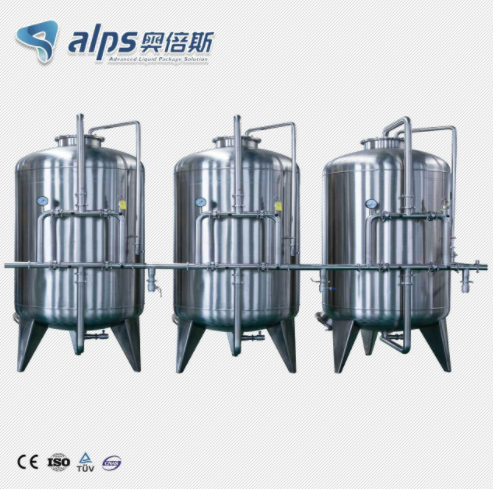Advanced Liquid Package Solution
Today we will detailed explain what is cooling water treatment.
Circulating cooling water refers to the exchange of heat through the heat exchanger or direct contact heat exchange method to exchange the heat of the medium and the cooling water is recycled through the cooling tower to save water resources. In general, the circulating water is neutral and weakly alkaline, and the pH value is controlled between 7 and 9 [1]. In the case that the circulating cooling water in direct contact with the medium is acidic or alkaline (pH 10.0), it is generally less.
The cooling of circulating water is the result of the three processes of evaporative heat dissipation, contact heat dissipation and radiation heat dissipation through the contact between water and air.
1) Evaporation heat dissipation: Water forms large and small droplets or very thin water film in the cooling equipment, expands its contact area with air and prolongs the contact time to strengthen the evaporation of water, so that water vapor will be taken away from the water for vaporization. The heat thus cools the water.
2) Contact heat dissipation: Water is in contact with air at a lower temperature. Due to the temperature difference, the heat in the hot water is transferred to the air, and the water temperature is reduced.
3) Radiation heat dissipation: the phenomenon that heat energy is transmitted in the form of electromagnetic waves without the effect of heat transfer medium.
The role of these three heat dissipation processes in water cooling varies with the physical properties of the air. In spring, summer, and autumn, the outdoor temperature is relatively high, and surface evaporation plays a major role. In winter, due to the decrease in temperature, the effect of contact heat dissipation increases.
The cooling water is continuously circulated in the circulating system. Due to the increase in water temperature, flow rate changes, evaporation, and concentration of various inorganic ions and organic substances, the cooling tower and cooling pool are exposed to sunlight, wind, rain, dust and debris outdoors. The entry of the equipment, and the combined effect of various factors such as the structure and materials of the equipment, will cause many problems.
In the circulating cooling water system, the concentration of bicarbonate increases with evaporation and concentration. When its concentration reaches a supersaturated state, or when the water temperature of the heat transfer surface rises, it will decompose to form carbonate and deposit on the heat transfer surface, forming a dense, slightly soluble salt scale, which has poor thermal conductivity. Therefore, the adhesion of scale will reduce the heat transfer efficiency of the heat exchanger. In severe cases, the heat exchanger will be blocked, the resistance of the system will increase, the efficiency of the water pump and cooling tower will decrease, local corrosion will be accelerated, and even abnormal production will be stopped.
In the circulating cooling water system, a large number of equipment is made of metal. Long-term use of circulating cooling water will cause corrosion and perforation. This is caused by many factors, mainly: electrochemical corrosion caused by dissolved oxygen in the cooling water; corrosion caused by harmful ions (); corrosion caused by microorganisms. Corrosion and perforation of the pipe wall of the equipment will cause leakage, or the process medium will leak into the cooling water, losing materials and polluting the water body; or the cooling water will seep into the process medium, affecting product quality, causing economic losses, and affecting safe production.

In the circulating water, due to the concentration of nutrients, the increase in water temperature and sunlight, create conditions for the rapid reproduction of bacteria and algae. The mucus secreted by the bacteria makes the dust, impurities and chemical deposits floating in the water stick together, forming deposits that adhere to the heat transfer surface, that is, biological slime or soft dirt. The adhesion of sludge will cause corrosion, and the cooling water flow will be reduced, thereby reducing the cooling efficiency; in severe cases, the pipeline will be blocked, forcing the suspension of production and cleaning.
In summary, after long-term recycling of cooling water, it will inevitably bring about scaling, corrosion and microbial growth problems. Solving these three problems can stabilize production, save resources and energy, thereby reduce environmental pollution and improve economic benefits.
Zhangjiagang Alps Machine Co.,Ltd is located at the new port city-Zhangjiagang, it was founded at 2011 and started with beverage filling and packing machinery. Our company covers an area of 15,000m2 and has standard workshop of 12,000m2. We have over 20 engineers in researching department and over 60 staff for machine manufacturing. We are a leading enterprise in research and production of beverage filling and packing machines. We are not only a machine manufacturer, we can also supply turnkey project according to customers’ request, including workshop design, machine layout design, water, gas, electic cable layout design, label and bottle design. Our mission is to ensure customers’ plant properly working and help customers win their market.
Our main products including: water treatment system, mineral water filling machine, labeling machine, packing machine, CSD production line, juice production line, 5 gallon water production line, PET bottle blowing machine, injection molding machine and so on.
We will carry on to meet the demands of our customers and seek for deeper cooperation with them. If you have more questions, please contact us immediately.

By continuing to use the site you agree to our privacy policy Terms and Conditions.